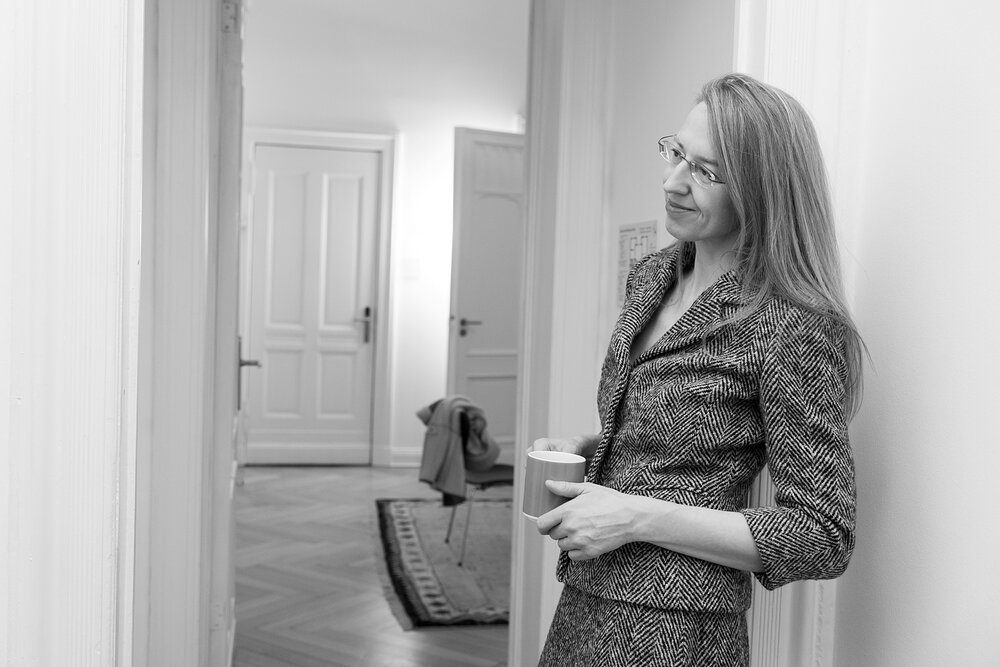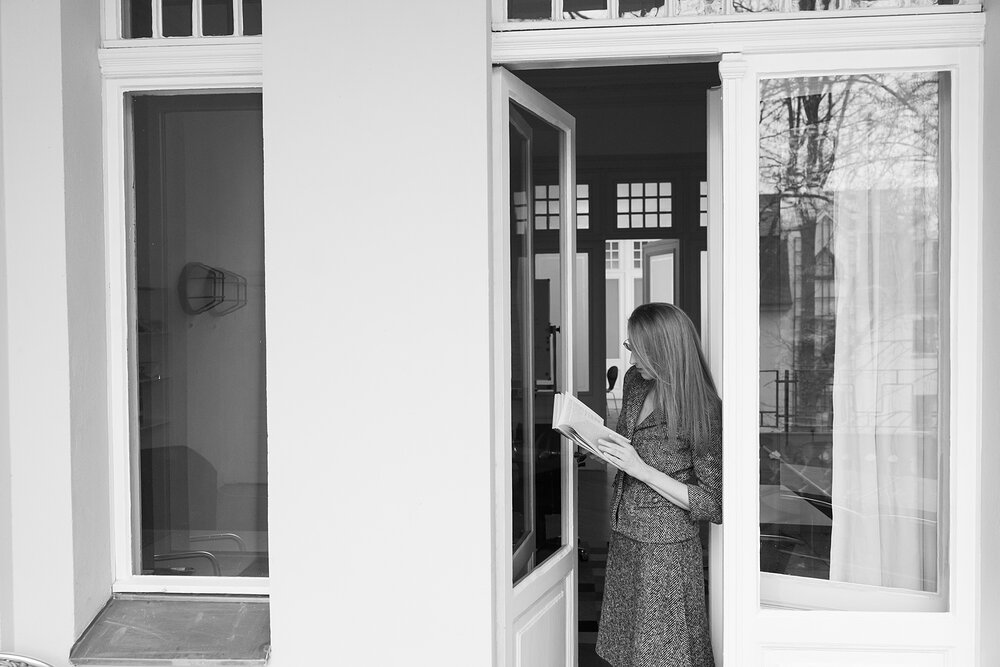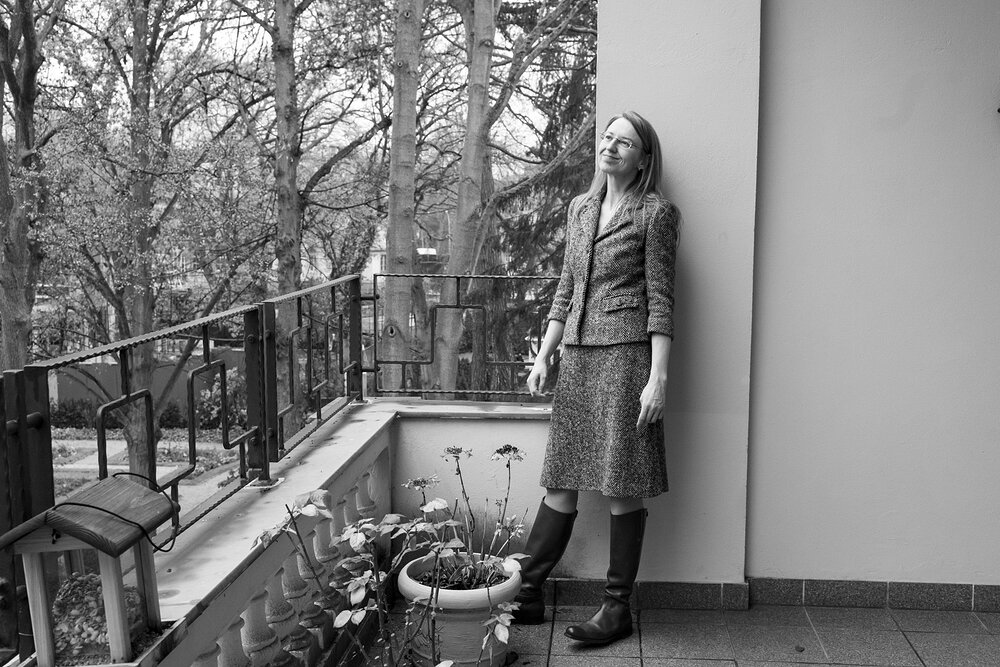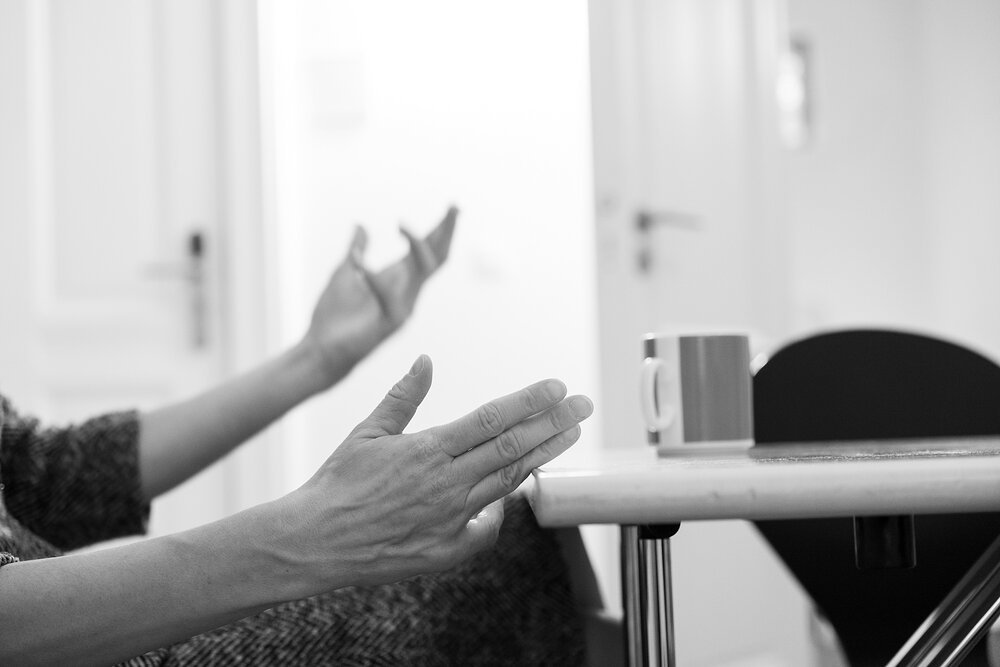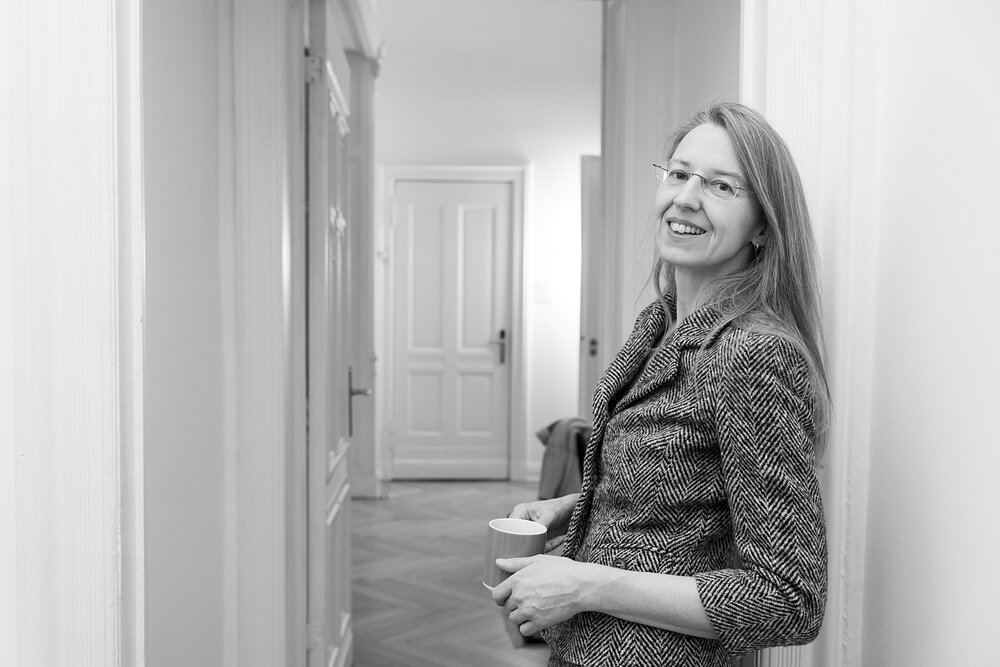Issue 15 / January 2020
„What interests me most is actually the social aspect“
Maximilian Steinbeis
The lawyer and legal philosopher Marietta Auer has taught and researched at the University of Gießen. After her Fellowship she will start as newly appointed director at the Max Planck Institute for European Legal History. In this interview, she provides insight into her career and the legal issues that concern her
Maximilian Steinbeis: We have known one another for a good quarter century, when we were both studying law at the Ludwig-Maximilians-Universität München. What kind of an institution was it back then? How was it for you at the time?
Marietta Auer: That was quite a formative experience. I was very young, I began my collegiate studies at the age of seventeen, and before that I was terribly bored at school. Going to this university, all that knowledge, the library – it was incredibly mind-expanding. However, in retrospect a lot of it was not at all good. Many of the lectures were incredibly sterile, very conservative or downright reactionary, my classmates were often arrogant, unfriendly and spoiled. But my basic experience was one of enormous freedom and the joy of maturing as a person. Fantastic!
MS: How did you come to study law?
MA: My interests were actually natural science and mathematics as well as philosophy. But I didn’t dare pursue any of these. I knew that I wanted to do academic work of some kind, but I didn’t feel I was good enough for mathematics and my parents were applying a certain pressure to choose something “useful.” That’s why I ended up studying law but with a mental reservation and the firm determination to make a beeline to mathematics if after a semester it turned out that I wasn’t enjoying the law. But from the very first day of that first semester it was so much fun! Although there were certain very reactionary and difficult people in Munich at the time, it was my good fortune that I ended up with a number of extremely good professors, one of them being Klaus Hopt who was my first teacher in civil law. That was the moment where I thought to myself: This is it!
MS: Did it have any relation to mathematics?
MA: Yes, of course. I was fascinated by the structural aspect, the conceptual aspect. But then I became a research assistant for Peter Lerche – that’s how you and I first met – who was a professor of public law. I hadn’t planned that at all, but it was very beautiful and formative, and criminal law with Claus Roxin was brilliant. These teachers were a revelation. The first four semesters passed far too quickly. Then came preparation for the exam and the fear you felt going into it. In Munich there was a great deal of competitive pressure. That was the part of my studies which rather spoiled the fun I was otherwise having.
MS: Becoming a scholar was fun but not becoming a lawyer?
MA: Preparation for the exam was like being sucked under by a maelstrom. I don’t come from a family of lawyers. There was no one who could have warned me how the years of preparation for this very artificial exam situation can leave a severe mark on you. And then the inherent damage done to one’s human dignity since you are told how inadequate you are up to two digits past the decimal point! It is so demeaning in view of everything that one can do in this wonderful discipline with this wonderful material. I had absolutely failed to notice how burdensome it was, especially for anyone who wants to formulate more nuanced thoughts, how you are subject to a kind of leveling process. Nonetheless the first state examination went pretty smoothly, but the second state exam was an entirely different matter. It was such a grim experience that I even considered giving up the whole thing. The second exam qualifies you for entering state service and you are made to order, as it were, while feeling the entire weight of the authoritarian state. You don’t notice this in your carefree youth but in hindsight it was oppressive.
MS: What does that say about German jurisprudence that it puts you through all that?
MA: The state examination is neither legal scholarship nor legal practice. It is a wholly artificial hybrid. On the one hand you are tested in your ability to use language, in your logical thought and in cunning argumentation, which is indeed a scholarly proto-qualification but not scholarship, and on the other hand it is not legal practice either. What a good lawyer can do is something entirely different. In Germany ever since Savigny all of jurisprudence has had this hybrid status and mediatory function between legal practice and a wider philosophical discourse. But that doesn’t work anymore these days. Jurisprudence can no longer function as this mediator because the national and European legislators place us under so much pressure. The hubris of the nineteenth century which held that jurisprudence is a system-building legal source – all that is over. So those in jurisprudence must carefully consider just how the discipline will produce theoretical, systematic thought in a way that is compatible with the practice of law but no longer regarded as its defining yardstick as was still the case a hundred years ago. Or even fifty years ago. Maybe even thirty years ago when we were both studying in Munich. In any event, all this is still contained in the odd construct of the state exam like a petrified fossil. The second exam was the nadir of my legal education.
MS: Which is why you then considered sociology and philosophy?
MA: I had always been interested in theory. After the second exam a lot of my friends thought that I was now becoming a philosopher after all, but it never came to that. Ultimately my love of jurisprudence was stronger – the concrete aspect, the connection to society – and hence sociology. What interests me most is actually the social aspect. In the early 1990s, when we were studying together at the university in Munich, it was a time of incredible social upheaval which I found terribly confusing at the time. The study of law was a challenge – to understand in what kind of a country one was living, in what kind of system, how that society functioned. I had to travel a long path through juristic dogmatism until I was able to return to these central questions. A key moment for me was in the mid-1990s when I discovered that paragraph 175 of the penal code – the punishability of homosexual acts – had first been expunged in 1994. How could it have been on the books for so long? That floored me.
MS: How did you arrive at your dissertation topic?
MA: My teacher Claus-Wilhelm Canaris was taken up with methodology. I intuitively understood that there was a problem here, that the doctrinal pseudo-rationality of German jurisprudence was a good subject for study, so I also knew that I had to go to the United States – legal realism – that’s what I needed to learn! And that’s how I came across the topic of the general clauses in private law.
MS: This state of tension – on the one hand your legal studies and being part of the legal profession, on the other hand taking up an observer’s position and from a theoretical perspective asking what one was actually doing there – does that describe your research program?
MA: Yes, to a large degree. It was also natural for me to adopt the position of an observer. As I said, I came from a different background, I wasn’t socializing with all those sons of notaries driving around Munich in their BMW convertibles.
MS: Also as a woman?
MA: Also as a woman. Munich had not only an extremely conservative faculty but their whole style and how students interacted with each other was pure machismo. You weren’t taken seriously at all as a woman. The odd thing about Peter Lerche, for whom I worked as a student assistant, is that he was a very conservative person who had a very unconventional and intellectual female assistant . . .
MS: Ulrike Bumke.
MA: Exactly. Ulrike Bumke. She was a kind of guiding light for me. I thought to myself: Ah, this too is possible! All the same, it would have certainly been good for me to leave Munich for a time, but which never happened for a variety of reasons. I finally stayed on because of people like Ulrike Bumke and Claus-Wilhelm Canaris. But even with Canaris it was not easy to break in. You had to wait a very long time until you were recognized. My entire time as a doctoral student and then as a research assistant I wasn’t taken seriously by my male colleagues. Though I have to say that Canaris was an exception to this.
MS: Didn’t the grade you received on the exam at least have a certain leveling effect? Those two digits after the decimal point which you get stamped on your forehead, didn’t it radically change people’s perception of you in one way or another?
MA: True enough. And that’s also what I experienced. Like everyone else I ran to the mailbox on this day of days, really keyed up, and there was a slip of paper with a rather nice grade on it. I went straight to the university and sat in the courtyard where the fountain is. I sat there for hours waiting for my admirers. But nobody came (laughs). I was a very small fish and Munich was a very big pond. So a top grade is nice but doesn’t make for surefire success. There are many people who get good grades on their exams. And then there were so many of these older assistants slouching about, who hadn’t gotten anywhere despite their fantastic grades because they hadn’t finished their dissertations. Getting a good grade on the exam was your ticket of admission. But then back to the rollercoaster. You did get in, but then it got even lonelier. You have to ask yourself if this is truly the path to knowledge and intellectual development – being first sorted out through what can only be described as a trial by ordeal.
MS: Have things improved since?
MA: I think it’s more relaxed at the little University of Gießen where I’m now teaching and Hesse in general. Today it’s no longer so inhuman. For instance, in contrast to Bavaria, the Judges Election Committee in Hesse is not only looking at exam grades two digits after the decimal point but takes a bit of life experience into account. They also consider whether someone creates a favorable impression not only as a judge but as a person. For example the Judicial Examination Office in Hesse is headed by a social court judge whom I greatly esteem and who is also a trained healthcare assistant. In Bavaria you would be considered as having just wasted your time with that on your résumé. Added to this is your certain field of specialization, a facet which has meantime been incorporated into the university exam. There are numerous problems involved here, but in this way we can impart the feeling to students that they are helping to fashion something and that we also have a closer relationship to them. In general we can do quite a lot to mitigate this demoralizing fear.
MS: This fear – is that a German phenomenon?
MA: It could well be the case. It’s bad for German society that we operate so much with fear.
MS: And bad for scholarship.
MA: And bad for scholarship. The path to scholarship in Germany is extremely difficult. I have seen a great many people founder along the way – on the qualification requirements, on a lack of mentoring, on the endless adjunct teaching jobs.
MS: If you fail then it’s your own fault. You simply weren’t good enough, not tough enough.
MA: Failure is privatized. If you’re successful then everyone is proud – your teachers, your benefactors – but when you fail you fail by yourself.
MS: Apropos successful, you will be appointed to the Max Planck Institute for European Legal History in Frankfurt in order to establish a new department for legal theory. What exactly are your plans?
MA: In 2012 the German Council of Science and Humanities demanded that German jurisprudence take the fundamentals into greater consideration and finally cut the nineteenth-century tie to legal practice. I have always done private law from a theoretical standpoint and as informed by my interest in modern society, to which private law is the key: we define ourselves as private persons. I’m interested in the concepts of autonomy, privacy, individuality, and personhood, and it’s a great challenge to create an institutional bastion for this kind of research. The report of the German Council of Science and Humanities was an important impulse but was ultimately unsatisfying because it merely juxtaposed theory with practice. But the interesting question is how one takes the insights of such disciplines as the philosophy of law and the sociology of law – that is to say, the theoretical foundations of the law – and refers them back to legal doctrine. The answer cannot be to abandon doctrine and simply pursue research in “Law and (fill in the blank)” fields as they do in the United States. The specific continental European legal theory can prove fruitful in a way that doesn’t merit its being merely tossed aside. The foundational subjects of the law must reform it from the inside out. It won’t work any other way.
MS: At the same time the subject matter of jurisprudence is changing and expanding at a dizzying pace.
MA: Jurisprudence as a spider in its web which builds a system from traditional principles of private law and feeds the courts while continuing to spin the unity of national private law – that simply doesn’t work anymore. The system has an openness toward the international sphere and is no longer functional because of the rapid legislative activity.
MS: But is it solely the legislative activity? Algorithms are gradually assuming the task of steering society and pushing law to the fringes.
MA: Maybe the legislative as well as court activity is merely symptomatic of where society is currently heading. My project here at the Wissenschaftskolleg focuses on our understanding of autonomy in the digital age. So much of legal thought revolves around the notion of autonomy. For example data autonomy – can we exercise consent in a traditional legal way when we don’t even know what we are doing? Our data is so widely disseminated and the whole big-data phenomenon has become so disengaged from users that individualization is no longer a sensible description of what is presently happening. Gilles Deleuze says that the individual is becoming a “dividual,” meaning that the formerly indivisible is becoming divisible. The human being is becoming fragmented into data packets, into so-called “pattern matching.” The notion of one’s distinctiveness is becoming an illusion. Truth to tell, we are completely predictable. We have always been this way but just haven’t noticed it. But the new developments have highlighted it. What does that say about us when we define ourselves as legal agents? Is there “ownership” of data? How do we close off the protection loopholes – hate speech, hacking – when we are lacking the standards? More generally we have to ask ourselves how we actually construct law in the digital sphere. With the granulation of legal norms – the notion that algorithms can precisely calculate behavioral norms on a case-by-case basis – we are relinquishing the idea of the same general rule of law for all. This fundamental achievement looks like downright stupidity: in the future everyone will have their tailor-made digital supernanny at their side. I consider this to be very dubious and ultimately undoable.
MS: Why?
MA: It brings us back to private law. Gaspard Koenig speaks of the dissolution of the individual. Others say that in the digitally standardized world there are no more accidents, that there is no longer the possibility of a deviation from the norm. Nudges instead of norms. That is to say, governance through the targeted use of sub-conscious behavioral incentives instead of open commitment to norms and standards. I don’t believe that. Society is changing unbelievably fast. How that will progress and whether the plug will ultimately be pulled and we all thrown back on ourselves again in an analogue world – nothing is certain.
MS: And now we’re back to where we started – the elimination of the possibility to exit things and look at it all from the outside. The norm and compliance with the norm, my decision and the behavioral expectation imposed on me – everything merges, a world which is coming undone and without resistance and from which one can no longer step outside and ask: Why? And then you come along and say that you will do just that and look at things from the outside.
MA: You describe the dream of all totalitarians in all countries and in all epochs. With respect to me, it also comes down to my own personality. I’ve always had an obdurate streak. It’s just the way I am.
MS: Something that no algorithm can calculate.
MA: Exactly!
More on: Marietta Auer
Images: © Maurice Weiss
